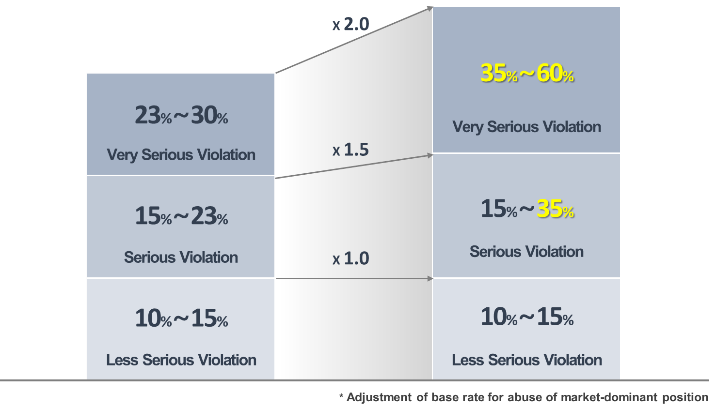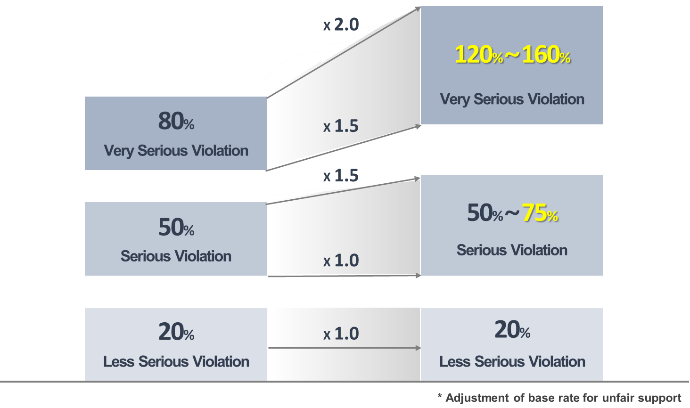The amendments to the Korea Fair Trade Commission’s (the “KFTC”) Notification on Detailed Standards for Imposition of Administrative Fines (the “Amendment”) took effect as of December 30, 2021.
While increasing the maximum base rate and base amount of administrative fines in line with the amendments to the Monopoly Regulation and Fair Trade Law (the “FTL”), which also took effect on December 30, 2021, the Amendment aims to improve the administrative fine calculation system by (i) partially adjusting the detailed assessment standard for unfair collusive acts, (ii) adjusting the mitigating criteria for secondary and final adjustments and (iii) revising the calculation method of relevant revenue.
1. Increased Base Rate and Base Amount
The maximum base rate (in case of fixed rate fines) and the base amount (in case of fixed amount fines) of administrative fines that could be imposed for each type of infringement doubled under the Amendment. In addition, the Amendment increased the base rate for each category of severity.


2. Adjustment of Detailed Assessment Standards
The detailed assessment standards used for determining the imposition rate and the amount based on the severity of the violation have also been amended under the Amendment. More specifically, while the Amendment classifies the degree of violation in accordance with the detailed evaluation standards, it allows the degree of severity to be determined differently by considering other factors in exceptional circumstances where mechanically applying the degree of severity would contravene the principles of proportionality and equity. The factors to be considered in such circumstances include the intent, purpose and motive, and background of the violation, and customary practices in the relevant industry.
In addition, to prevent calculation of violation points for “unfair collaborative acts” being too excessive compared to other types of violations when calculating administrative fines, the detailed assessment standards for “unfair collaborative acts” have been amended. That is to say, the thresholds for calculating the violation points in connection with anti-competitiveness, market share, and regional scope under the detailed assessment standards for unfair collaborative acts have been partially relaxed.
3. Expansion and Clarification of Mitigating Factors
The Amendment added mitigating factors that could be considered at the secondary adjustment stage. For example, it allows fine mitigation of up to 10% for violations caused by undisputable, less-severe negligence. Further, in addition to mitigation of up to 10% for cooperation with investigation, “cooperation with the KFTC’s deliberation” has been added as an additional mitigating factor of up to 10%.
In addition, the Amendment addresses a concern that existed under the pre-amended notification, which was that it conflicted with the principles of proportionality and equality by allowing mitigation in excess of 50% for considerations over the respondent's financial situation and ability to bear the administrative fines, while it limited mitigation for considerations over market/economic conditions and the size of unjust enrichment to 10%. To address this concern, the Amendment adjusted the mitigation ratio for considerations over market/economic conditions or unjust enrichment up to 30%, which can be further expanded up to 50% if necessary to be consistent with the principles of proportionality and equality. In addition, the Amendment newly provides that, for mitigation based on the respondent's ability to bear administrative fines, the factor of “whether continued business operation is infeasible” should be additionally considered in order for the mitigation ratio to exceed 50%.
4. Others
In addition to increasing the maximum base rate and base amount of administrative fines and adjusting the detailed assessment standards, the Amendment clarifies the criteria for calculating “relevant sales revenue” for cases involving bid rigging and sets forth a legal basis for objectively and reasonably calculating the sales revenue based on other available materials in case the company to be fined does not have or submit the details of its sales revenue. As a result, imposition of the fixed-amount administrative fines would be limited to exceptional cases where the relevant sales revenue could not be determined even after reviewing such materials. Lastly, with respect to the calculation of the number of violations for which administrative fines may be aggravated, the Amendment stipulates that the calculation of aggravating factors shall include criminal referrals made at the request of the Prosecutors' Office, the Ministry of SMEs and Startups, or the Public Procurement Service.
The Amendment is expected to further enhance predictability and reasonableness in calculating administrative fines under the amended FTL. However, since the actual level of administrative fine to be imposed will be determined on a case-by-case basis, it would be necessary to establish appropriate response strategies at each step, taking into account the relevant circumstances of each company.
Related Topics
#Administrative Fines #Antitrust & Competition #2022 Issue 1 #Newsletter








